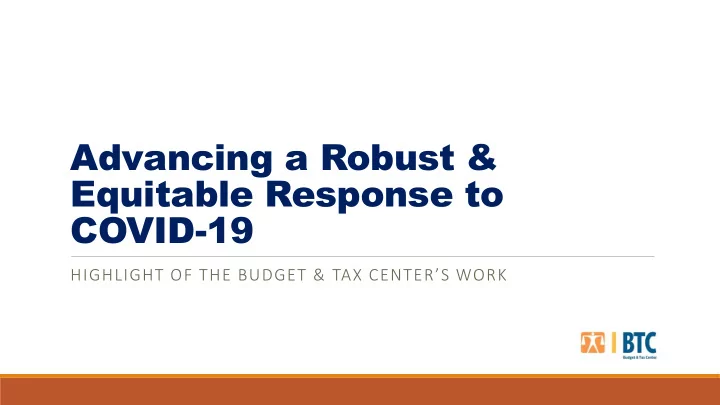

Advancing a Robust & Equitable Response to COVID-19 HIGHLIGHT OF THE BUDGET & TAX CENTER’S WORK
Overview of our format • All participants are on mute by default. •We are recording the presentation and will share it will all registered guests within 24 hours following the presentation. •We will be pivoting to Q&A about halfway through the hour – please enter your questions in the chat box. •If you have further questions about today’s presentation, please contact kim_marie@ncjustice.org. 2
Agenda Where we are now Rick Glazier, Executive Director The work of the Budget & Tax Center in COVID-19 Response Alexandra Forter Sirota, Director Q&A - 20 MINUTES Kim-Marie McLellan, Deputy Director of Gifts and Endowments 3
Budget & Tax Center Team
We think big. We know details matter. We partner & collaborate. 5
NC can’t lose another decade Length and severity of recession will depend on policy actions taken Overview Targeted and inclusive policies are crucial in the response Building the will to act requires broad-based engagement and strategic communication
COVID-19 in NC • Three points 7
8
Public institutions must deliver anti-racist outcomes 9
Current economic and fiscal projections remain uncertain. Policy choices that support people first can deliver certainty and stronger recovery. 10
The End of Economic Expansion 11
Unemployment Insurance initial claims unprecedented, underrepresent harm Weekly Initial Claims, May 9, 2020 12
Economic harm and length of recession still being quantified Deeper initial losses of work and wages than originally projected CBO PROJECTION, Q2 2020 APRIL UNEMPLOYMENT RATE 14% 14.7% Risks of permanent closures of small businesses heightened • Data from FEMA during natural disasters suggest 40 percent of businesses won't re-open • Survey data in NC of child care providers suggest 1 in 3 would not be able to re-open without public support. 13
Economic harm and length of recession still being quantified Deeper initial losses of work and wages than originally projected CBO PROJECTION, Q2 2020 APRIL UNEMPLOYMENT RATE 14% 14.7% Risks of permanent closures of small businesses heightened • Data from FEMA during natural disasters suggest 40 percent of businesses won't re-open • Survey data in NC of child care providers suggest 1 in 3 would not be able to re-open without public support. 14
15
NC revenue losses estimated at $4.2 b. FY 2019-20 FY 2020-21 $1.6 billion (6.6%) $2.6 billion (9.9%) 16
$2 Billion in federal funds remain for N.C. Amount passed by NCGA, $1,575,988,029, 44% Remaining state Coronavirus Relief Funds, $2,009,011,971, 56% Source: NC Budget & Tax Center analysis of HB 1043 17
Federal Fourth COVID-19 Package •Aid to state and local governments •15% Increase in SNAP benefits for all North Carolinians who use SNAP •Extension of UI programs •Rent assistance and inclusive cash assistance •Increase in federal share of Medicaid costs 18
Smart public policies will matter to the economic recovery • Providing additional weeks of unemployment insurance, raising weekly benefit level • Increasing access to food assistance • Providing cash assistance to people facing economic insecurity • Implementing a subsidized jobs program for low-income workers • Increasing housing assistance to prevent a sharp rise in evictions and homelessness • Ensuring budget stabilization through a combination of federal and new state dollars that maintains public services 19
Unmet needs & gaps in existing response • Nearly 1 million North Carolinians have filed Unemployment Insurance claims to date • Over 100,000 more people received food assistance in April • An estimated 723,000 have lost employer-sponsored health insurance • At least 1 in 5 work in occupations that put them at greater risk of contracting COVID-19 • One-third of child care providers say they will have trouble re-opening 20
Connecting the dots to address the gaps Administrative policy —hazard pay for early childhood workers, increases in TANF and SNAP benefit levels, flexibility in application and recertifications Legislative policy – cash assistance, remove barriers to food assistance and long-term systemic changes to anti-poverty programs 21
Local direct cash assistance for those left out of CARES Act More than 670,000 North Carolinians missing out More than 370,000 dependents aged 17 or older claimed on their parents' tax returns. $563 million in cash to North Carolina households at risk 22
Healthy people build a healthy economy.
Discussion 24
VISIT NCBudgetAndTax.org FOLLOW @ncbudgetandtax 25
Recommend
More recommend